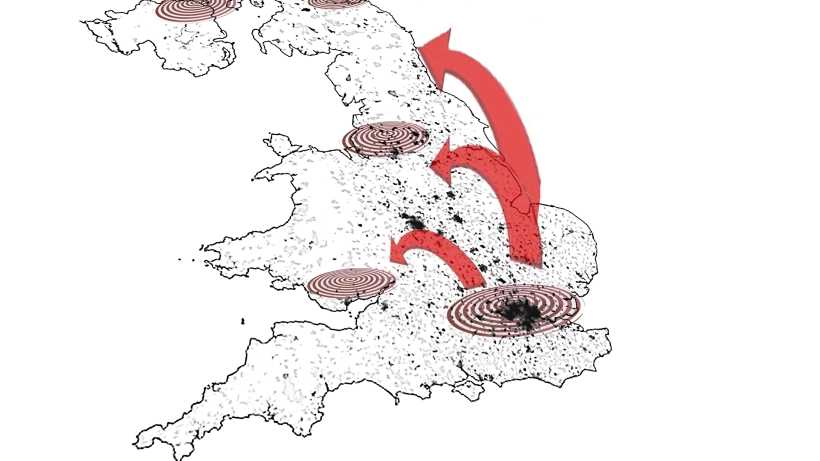
Source: Image by G_marius
The process of devolution in the UK seems irreversible. The big question is how to decentralize power among the different levels of government.
Debate created by GlobalNET21
Devolution, for all of the United Kingdom, is here to stay. There is now widespread agreement about the benefits of dispersing political power, away from Whitehall & Westminster, for the United Kingdom as a whole. However, whilst this general principle is accepted across influential sectors of UK government, the business community and other important civil society groupings, significant divisions still exist about the nature and scope of devolution policy.
Levels of government and devolution in the UK
Scotland, Wales & Northern Ireland exhibit established, democratically accountable institutions of devolved governance. Greater London boasts an Assembly and a directly elected executive Mayor with limited competency but elsewhere across England, progress has been slow to emerge. UK government proposals for a Greater Manchester Combined Authority Executive Mayor are now underway – and could provide a model replicated in other English provincial city conurbations?
Against this background the geographic framework of devolution across those parts of England outside Greater London is of particular interest, often arousing fierce debate and differences of opinion about what form of sub-UK unit (or Region) might provide the most effective vehicle for robust institutions of devolved, democratically accountable power.
During recent years a number of ideas have been proposed and/or implemented, with varying degrees of success. What shape might the direction of devolved governance across England take to complement that already in place elsewhere within the Union? What is the optimal size of a Region – participants should consider the underlying tension existing as a cost-benefit trade-off between the benefits of size flowing from economies of scale and the costs of heterogeneity. In a large Region, per capita costs may be low, but the heterogeneous demands of a large population make it hard to deliver services and formulate policy. Smaller regions may find it easier to respond to citizens’ expectations in a democratic way?
One option is that we devolve to city regions where the large conurbations work together in a devolved form of Government. That is being proposed for the Greater Manchester area and beyond at the moment. Another option is to devolve power to regional governments across the United Kingdom. There is some question about how these regions should be made up and how large they should be. A further option is that we should return to the old shires with the county councils and that power should be devolved to them. Finally there is the view that the United Kingdom should become a federation with separate governments for England, Wales, Scotland and Northern Ireland with large devolved powers and a Federal United Kingdom as well with powers over security and defense. How should the future UK look like?
If you change your mind, you can change your vote simply by clicking on another option.
New to netivist?
Join with confidence, netivist is completely advertisement free. You will not receive any promotional materials from third parties.
Join the debate
In order to join the debate you must be logged in.
Already have an account on netivist? Just login. New to netivist? Create your account for free.
You are viewing a filtered list of comments. Click the button above to view all comments.
Last edited on 07 July 2015 @ 14:13
After much research and much thought with many experts in these constitutional and political matters I'd offer a suggestion that resolving the complex and thorny problem of devolution raised in this country over the last generation can be done more easily through the process of fully answering three main questions. There are other consequent questions to whatever answers we collectively/democratically reach but a way to make progress is to answer these questions;
1. Which functions of a 21st century state are best carried out in concert? By this we mean 'organised and funded on behalf of all citizens rather than any subset of them'. These should then be organised, executed and funded at a communal/central/state level. There may well be whole areas of endeavour which fall into this category (national defense, membership of international organisations, international diplomatic services etc) but more often it will require us to diagnose which elements of current state and local functions can and should ONLY be done at a state-wide level for best effect.
2. Of the remaining functions, what is the most widely accepted level of devolved organisation? This presumes that electorates choose a devolved level being informed of the full economic and political consequences of the alternative structures available. Regional, city-state, county, borough or street can be assessed pragmatically. Notice that this is not a technocratic choice but a democratic one; it may not result in the 'best' option being chosen but it should enjoy the most widespread support initially. It will entail some element of less than perfect economic costs but these can and should be minimised (many large companies for example manage to devolve many aspects of decision-making down to local levels whilst retaining central services to maximise legal or purchasing benefits across the whole group).
Answering these two questions should provide us with a far better structure than we have now. But while we're doing that relatively short work we could also use the resultant changes in our civic structures to address the many and varied holes that have developed over the last thousand years in our social fabric so could answer this final question;
3. Can we construct mechanisms of law, economics and politics which enable continual, transparent and flexible monitoring and amendment of the chosen arrangements to be applied equally by all citizens? This involves codifying our constitutional rights and responsibilities and enabling the exercise of them through institutions and mechanisms appropriate for our current and predictable states of technology, social understanding and communal codes of living. We outside the 1% all know why this is necessary.
We have the chance to wipe-away the injustices and legacies of our past that we currently live with through an exercise not of 'what is the least objectionable change that can be wriggled through our current processes?' but 'what would we like our society to look like for our granchildren?'.
What I'm saying is that the same logic and reason that determines the 19th century structures we currently function under (central government for those issues of power and common benefit, local government for those factors requiring more individual attentions) can also function as our entry to this debate but brought up to date. We can and should be able to reach consensus on the list of issues which require (whether by dint of economic justification or by political justification) a communal organising principle and funding from those which are more readily and practically organised more locally. The technology and understanding we have gained over the last hundred and fifty years of social evolution can and should inform us here. We no longer need 'our' individual wishes to be 'represented' by someone else elected in a plebiscite once every five years; that is a very low resolution way to capture democratic wishes. If 20 million people can successfully manage to express their choices for a singing contest one Sunday evening, I'm sure we can manage to bypass the political party trough we currently suffer under with a simple technological solution that captures our individual wishes on a whole manner of issues.
Reaching some clarity on this list of issues to be addressed at a state level and the requirements needed to make them function well for all citizens will largely determine the size and scope of all remaining issues which need more local action. We do not need to operate in a vacuum here as many countries already have much practical experience we can draw on in terms of devolved governance structures; the US, Germany, Russia etc. If we learn the best lessons they have experienced, this process should be short and fruitful.
I'm sure there are more able people than me to discuss how the nuts and bolts of the process to answer these questions should be undertaken in the UK now so I'll leave that to them but I urge you to have hope that these problems are not intractable, they offer far more hope for our future than is being widely discussed at the moment and they can be achieved.
Join the debate
In order to join the debate you must be logged in.
Already have an account on netivist? Just login. New to netivist? Create your account for free.


















